Throughout the years, Hip-Hop has seen a change in both its evolution and de-evolution. For the most part, the mainstream has been content, allowing the downward spiral of music with nonsensical wording and phrases through unknowledgeable lyricism and beats that pump through airwaves. Fortunately, a staunch number of music listeners and Hip-Hop heads have remained loyal to insightful lyricism, cleverly worded phrasing, and a preference for artists with substance. Luckily for us all, those artists still exist and are continuously embraced, much like REKS, that heady wordsmith out of Lawrence, Mass.
It’s been a few years since the release of his last opus, The Greatest X (Brick Records) back in 2016, but last month REKS resurfaced with his latest double LP, T.H.I.N.G.S. (The Hunger Inside Never Gets Satisfied). Filled with 19 tracks of nimble-fingered beats and sharp-witted lyrics, the album stands far above his contemporaries. Along for the journey are Lil Fame, Pharoahe Monch, and a number of other rappers that rip through beats on the release. I caught up with REKS at home and we talked about his new album, the culture of Hip-Hop, the complexities of family, and much more.
Let me start off with how you’ve been dealing with 2020. I’ll hit you with a word and you can respond to it: Corona Virus.
Ah. Unfortunate.
Politics.
Bullshit.
Racism.
Ongoing.
I know it’s always been something that’s prevalent, the only difference now is that it’s being documented, whether it’s dealing with police brutality or those that have found solace in “Trump’s America” where they made the racists feel comfortable enough to show their faces in public.
To add to what you were saying about “Trump’s America”, I really don’t think people have truly been brave to show their face, their racist face. The time frame we live in now, things are just more readily visible, so that creates a circumstance where things are happening in real time, and you’re seeing more of the instances. Just like in the civil rights movement when things were starting getting televised. That’s when things started to become a little more visible. I’m actually experiencing this vicariously but I’m still seeing what these people were going through, and that was the beginning aspect of it. Now everything is like, real-time.
Right, you also kind of touched on it with “Rachel Green.” The way your words moved on it in that music was pretty dope, you encapsulated so much truth about racism and what I like to call the Karen-isms and privilege many people of color aren’t privy to, you know?
Absolutely, yea and thank you for acknowledging that.
Your new album T.H.I.N.G.S., you dropped this joint with 19 tracks. My initial reaction was that it
was kind like a homage to your own story, your career so far. Is that why you included 19 tracks on
that?
No, I mean I honestly feel like throughout my career, it’s kind of had, outside of the great effects, this pocket of records that’s always been between 14 and 20 songs. I don’t think I’ve ever really not been in that pocket. I’ve kind of been married there. And you know, The Greatest X being a double album, truly made it a double album because it fits in the pocket of what a typical album would be, between that 14 and 20 songs, on two joints. So yeah, I mean I just did what felt right. I know that throughout my career people had advice. Some good, some bad. People have had their opinion on ways for me to go and I’ve always just followed my gut, and you know? In this day and age, it’s obvious we’ve been told, you know, don’t do 19 songs, that’s insane, but
I just did what felt right.
Right. And you know, at the dawn of Hip-Hop people were telling rappers “You can’t do a full album.” That’s one thing I remember. You never expected rappers to do full albums and then all of a sudden you had groups doing full albums and making them extra-long.
Absolutely.
That’s just like something I’m recalling here, but there’s a lot you’ve expressed about rekindling that fire for the new album. Was there a point when you thought maybe your music career was coming to a close?
No. I mean, I did feel like if I was going to stick with just music I was going to be caught in this one-trick pony thing, and that’s more what I was concerned about, if anything.
When it’s all said and done, and my legacy is what it is, I don’t want to be captured as just an artist who put out Hip-Hop music. And that’s why over the past few years specifically, I’ve made it a point to start becoming active as far as health and wellness, and being mindful about financial literacy and specifically education and books. And it’s a thing that I love and a thing that is natural to me, and that’s where more my concerns lie. I didn’t want to be just that individual who was specifically tied to one thing.
You know when they write the book on Reks, as a human being, that’s all they knew me for.
Man you’re talking about writing the book on you, and it’s like, they could write a book on you just off this album alone, you know?
I appreciate that. That’s a beautiful thing to say. I really make it paramount in anything, any art I put out there. Anything I work on, you know, focus on leaving something that’s lasting and has its own legacy. So it’s beautiful to hear you say that.
No doubt. Now you open your album with “Strong.Ready.Able,” you unexpectedly touch on real issues here like family. Is that the root of who you are at this point?
I would say, you know, me, connecting to the “all” of things is who I am, I think family is a part of that, being able to become disconnected from outer everything, and to be able to look inside to become closer to…when I say “the all” I’m saying, transcending beyond the simplicity of all the chaos of the everyday world that we live in. I’m looking to become more connected to the divine and the “all” that is everything in this world, and in doing that, being a part of the family is a major factor. So definitely, family plays a major role.
If I could just be very clear, it’s that in order, throughout my life, for me to become a better father, husband, son, whatever the case may be as far as my village goes, I had work on getting myself right. Being inspired to grow as an individual connected to the entire everything.
You even look back, and you have “Nana & Grampy’s Song”, which is an ode to your kin as well, I know that’s one track that’s close to your heart, too. Do you want to expand on that?
Absolutely. So again, the family thing definitely plays a major major role and you know, I like to use the word village and my tribe, because we are connected and rooted in a way that draws us back to our ancestral lineage. It’s our tendency to forget how important it was at one point in time and in this materialistic time now, to be more connected with our elders and our ancestors. And our roots, that draws us nearer to each other, connected to a village, or to a tribe. “Nana & Grampy’s Song” specifically talks about two individuals who completely shifted and changed the path and dynamic of what it was going to be like for me growing up, because they made a move from the South to the North, very close to the period of the great migration north, and made a decision that they were going to go to this small city in Massachusetts.
Our family roots are not connected to Massachusetts. Our family is from the South, and prior to that, obviously the diaspora and the many connections to individuals in the slave trade of this land. So they made a decision to move to a town completely remote from where our roots were, and it became a new legacy for us. Nana & Grampy created a whole new sprout of our family, in a new location. It’s a beautiful thing and I’m thankful for them.
That’s amazing. I mean, I just enjoyed your description of everything on there.
Thank You.
Now the album, I noticed a lot about this one here– usually when an artist has such a wide array of producers, production, the release is sometimes is left unbalanced. With T.H.I.N.G.S. though, it sounds pretty seamless. Just wanted to point that out. I’m sure I’m not the only one that’s actually heard that. Do you want to talk about that a bit?
I have got a lot of response on the placement of the music. I’m grateful for people’s observations in terms of how seamless it does sound. I feel like that’s just a process, over time, of consistently putting out projects and being able to get to the point where you can see how things can flow.
Not to play on words but it just to really gets to the point where you can kind of master your craft with it. I do feel like this album, of all the albums, flows the best for me.
Yeah, it’s pretty cohesive.
Appreciate that. The objective, not only just with the instrumentation, but with the message and the vibrations, like of what joints fit together, and then what messages fit together. You know, making sure there’s an ebb and flow to the entire aspect of it is paramount to me putting it together.
Shout-out to my brother Jon Glass who put a lot of work in it, and my Queen, Julie, Queen Philosophical, that’s my wife. She’s a major major part of this as well as my daughter, Jada, they played a major part. And they were at a lot of the sessions. And kind of like bounced off songs nonstop with me, consistently, to the point where, you know, they’re spitting all the lyrics. Sometimes when I’m stumbling words I look at my wife and she’s saying the lyrics better than I am. I’m like “ok.” (laughs) She’s listened a lot, you know.
And now you see, you take it back to family.
Absolutely.
What was your process in selecting your producers, like Nottz, Apollo Brown, Evidence, Statik, and the rest?
You know, some were built in, you know, obviously long lasting relationships. Statik’s been my brother for a very long time, and you know it was a great time for us to link up again. It’s been awhile since we’ve worked together and people were missing that feel. Nottz is someone that I’ve been working with over the course of like 3 or 4 albums now. And then there were brothers like Marco Polo who I’ve been wanting to work with for a very long time. I knew had the sound that I kind of wanted for the feel of this album. For me, following up from my last album, I knew that Marco Polo would be someone to add that perfect energy and I didn’t want to do something typical, I wanted to do something that people were not expecting. That’s why I did—- like when I got “The Wedding Song,” that’s why it’s something that took us both a little bit out of pocket, but not completely out of pocket because it’s still got that raw, boom-bap. It’s got the good vibrations to it, but it just definitely gave a different energy that I really felt was necessary for the both of us. And throughout, some of the lesser known producers who are so valuable to me over the years. Jon Glass with the intro; incredible producer. He has an incredible ear for mixing and music in general. And then ShortFyuz is someone who I work with consistently. He did my last album entirely, so that was a no-brainer. And then Mephux who did the outro. He’s like a different one, out of pocket, and I was kind of getting him out of his element of what he was doing because he’s doing a lot of work with like Conway and that kind of vibe.
But he was somebody who I had really wanted to put something together with. We’re doing a lot of things in the future so I was able to work with him and D.R.U.G.S Beats who did the most songs on the album, he was just someone I had been wanting to work with and it’s just never worked, the perfect time didn’t come together until now.
And then you know, Evidence, Apollo Brown– these are brothers who I work with. And I want to give a shout to my brother Andre X who’s an incredible up and coming artist in his own right. Singer, rapper, he does all the graphic work on all the joints I’ve been putting out as of late, so you know he’s a renaissance youngster for the new generation. Like it’s super dope to have someone like that to go off as well.
You’re talking about all these producers, and cats that’s you’ve built up relationships throughout the years. One thing I wanted to add, back in 2011, say like halfway through your music career, You talked about the excitement of working with other artists like Premier, Styles P, and Freeway. You respecting their work, growing up listening to them, now it seems like all of you are on equal ground. That’s from my perspective anyway.
I mean, I appreciate that, I doubt – I don’t feel that way in terms of the art that I put out. I do super appreciate you stating that. You know, I feel like these dudes have definitely put in and mastered their art over a longer extended period than me, and I feel maybe it’s just not my place to say, so much?
I’ll say it! I’ll say it for you.
I do appreciate that nod. It’s hard for me to look at that. Even working with a brother like Pharaohe Monch now is still shocking to me. And also, because I have so much massive respect for brothers like him. We just did this producer’s corner-like dialogue where I was in a room with O.C. and Mic Geronimo and Blacastan. It was like so incredible to be – these are brothers that I grew up listening to and admiring and just to have them give me a salute and a nod, it just felt incredible because my respect – specifically for O.C. growing up listening to Time’s Up, I say Time’s Up but I mean listening to Word Life and Jewelz, that shaped my early thoughts. Those two albums kind of shaped me. I grew up admiring these brothers so much with their pen game and it’s fabulous to be able to break bread with brothers, on records, and just to be able to have dialogues with them.
I feel that. But you know, speaking of Statik Selektah, of Pharaohe: “The Complex.” I’m sure it hits home with a lot of people who’ve had veteran family members come with PTSD and have had to deal with the lack of, and well as over-indulgence of doctors prescribing unnecessary meds. My uncle suffered that Vietnam PTSD and he dealt with a lot, but… how did that track come about?
The concept was that I wanted to touch on exactly what you spoke about, but I wanted to touch on the different aspects of the whole industrial complex – that entire industry, and you know, maybe premature in letting the cat out of the bag in what may be in line for the future, but there’s so much that can be talked about on that same topic further. I can expound on the prison, the education system – so many different aspects of the industrial complex. But Pharaohe, I wanted to get on a record for a very long time, I just wanted to make sure I had the right record, and with what Pharaohe had been doing, with war and PTSD and just like his whole approach, the way he dissects concepts in his own art, he was the ultimate voice I wanted for this record. Statik was my first go-to person for the production. I knew I wanted Statik, I knew I wanted Pharaohe. It just sat so well with this concept that I had been sitting with for a little bit and for Pharaoh to hear it and to love it and to just KILL it, from the beginning to end.
Not that I was even questioning that he would, but you know, the incredible artist that he is, he fit it so perfectly, and I’m just so incredibly happy to have been able to have him make a part in that record because I feel it’s going to be a lasting record in my legacy, and it’s beautiful to make this music with two of my brothers.
Everything just seemed to gel well, you know, on that track right there.
And I mean, not that I don’t want to touch on the topic itself, but I feel like the music actually talks on the topic and it delves into that notion that you’re talking about with your uncle and what’s it like to deal with trauma, to deal with the military, and the post effects of being at war, and dealing with thatsame war, the effects of war, at home.
Right, yea. But that was dope, too. A few years ago you talked about your connection to Nigeria and Ghana, after doing your research and all. How has that affected you throughout the last few years, as an artist, for one, and as a Black man?
So, just to be clear, what’s really interesting is that I drew those first parallels, not from what I was studying through Ancestry.com and all these different sites that like, draw people into looking into their lineage, and backgrounds, and finding out who they truly are.
In my research, through books, through documentaries, different things that give us insight as to who we are, as melanin-ated people of this earth. That specific time, I was so drawn to the diaspora and what happened with the Trans-Atlantic Slave Trade and what have you, through time my insight had grown a little bit to the point where I’m delving into the deeper roots and our embedded lineage and connections to America, Asia, and Africa as a whole, as opposed to just looking at it like as one fold, but it’s like such a beautiful rooted tree of our people having ancestral roots all across this earth and how I am able to draw a direct link to that lineage. Through my studies, I’ve grown to understand more and more about how beautiful this plethora of individuals – I don’t want to say “races”, but like, humans across the entire landscape of the planet. The connection for me is more than just Nigeria and Ghana, Boston and South Carolina, the Dominican Republic and Cuba, and wherever we can say that our people have traveled, where they have direct, original roots at. I find a connection and I’m drawn to human existence so much more now.
Wow. Now obviously you were helping your son with his homework when I first called you but what’s the legacy you’d like to leave behind for your family?
For my boys and my young queen now, because in getting my new wife, Julie, and her daughter Jada, that is my daughter as well. We’re making sure that it’s being expounded on them the idea that, no matter what you’re studying, no matter what you’re focused on, you must question everything. You must allow yourself to do your due diligence outside of what you’re just being told has value. Question all things and find beauty in questioning the history that you’re being told, specifically. Just that you know, the planet was considered Black until it was not. You know? And it’s ok to think outside the box and outside the norm.
So that’s what I let them know and secondly, and very importantly, I make sure they understand that they do not need to be workers. They can work hard, but they can work to be owners, and to be able to create long lasting generational wealth for our lineage and our legacy.
That’s a beautiful thing.


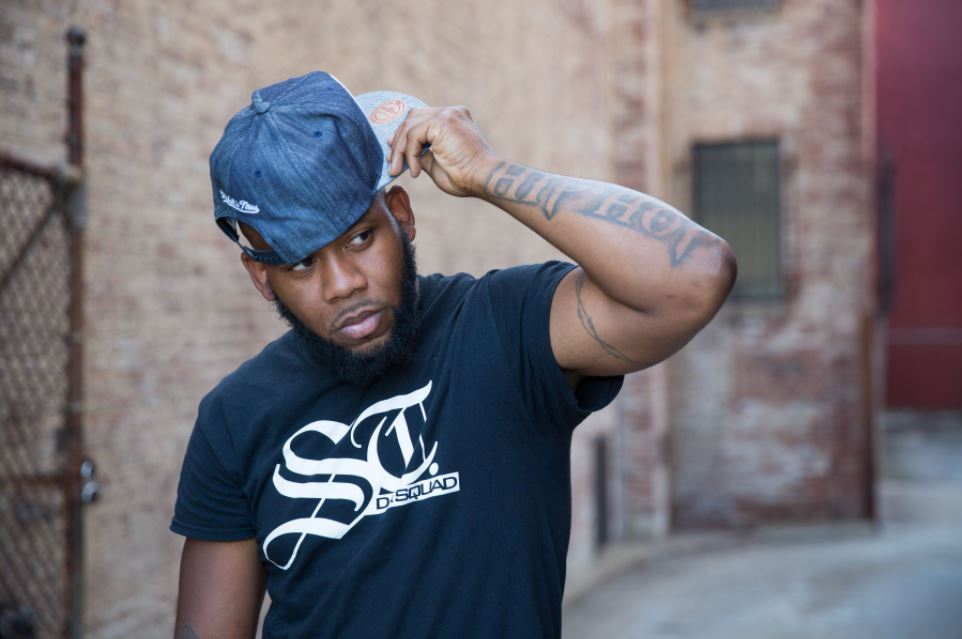
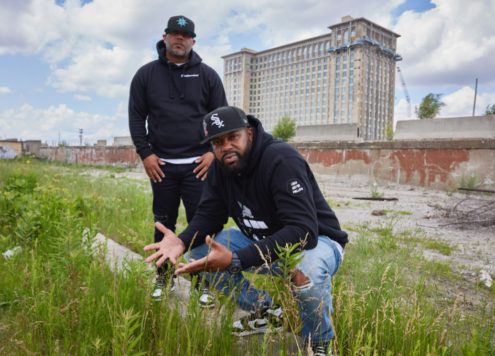
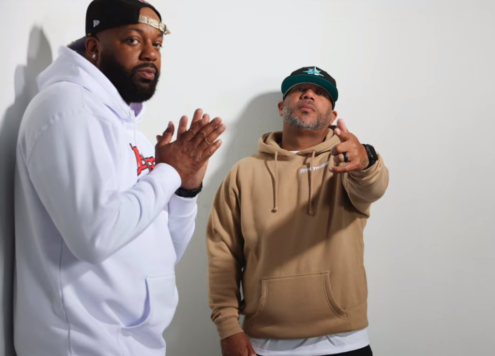
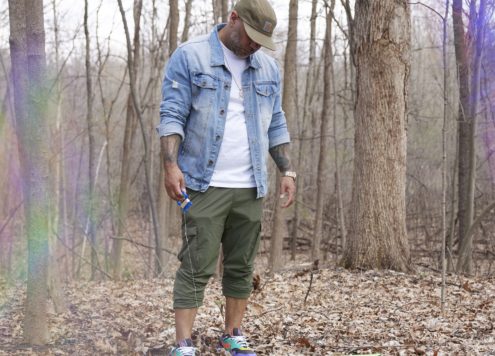
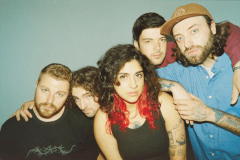
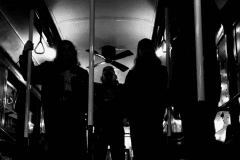



Social Media